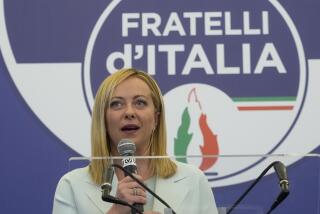Cavorting with Capitalists : Italy’s Communists Hold a Festival--Yuppie Style
- Share via
MILAN, Italy — In a display of bourgeois showmanship that includes dancing under the stars, gourmet dining and scores of capitalist sponsors and guests, Italy’s unorthodox Communist Party has spent $10 million on an end-of-summer jamboree that ended here Sunday, an extravaganza that party stalwarts hoped made them look as fun-loving, democratic and unthreatening as the yuppie next door.
Although not unprecedented as Italian political bashes go--each of the country’s political parties holds an annual festival--the Communists’ Festa dell’ Unita (Festival of Unity) adopted so many of the trappings of capitalism that the party’s red hammer-and-sickle flag looks almost out of place.
Even the dialogue during the nightly debates that highlighted the 18-day festival has been so unorthodox as to make some old hands wonder what ever happened to Marxist dialectic.
A debate on Tuesday, for example, was entitled, “Tonight, Let’s Talk About the Art of Seduction,” and featured three self-described feminists who leaned more toward giggles than a stern party line.
They agreed, in the words of leftist journalist Silvia Neonato, that women are breaking away from “years of rather austere feminism” and “beginning again to play on the theme of seduction in dress and behavior.”
The tent auditorium in which the seduction debate was held adjoined the elegant Cafe delle Donne (Women’s Cafe), one of 49 eating and drinking establishments that was set up on the festival grounds in downtown Milan’s vast Sempione Park. It was packed with a distinctly middle-class crowd of what appeared to be young urban professionals.
An occasional old party member clumped in, listened briefly, then clumped out shaking his head.
“We are trying to portray the reformed party image here,” explained Tonino Mulas, the festival’s communications director, when asked about the profusion of high-tech pavilions and elegant restaurants that were erected especially for the jamboree.
“We chose Milan to do this because it is the most European of Italian cities, the capital of the fashion, publishing and advertising industries with branch offices of all the multinational companies.”
It was the first party festival ever, he said, to have both a fashion pavilion, sponsored by the city’s distinctly upper class fashion industry, and an advertising pavilion under sponsorship of a wholeheartedly capitalist national advertising association.
Giants of Industry
Among other corporate sponsors who paid for space to install product promotional displays in more than 100 large temporary pavilions were such giants of Italian industry as Fiat and Olivetti, as well as some firms with names more familiar to Americans such as the local affiliates of Esso and Coca-Cola.
The numerous dining pavilions were a delight to cosmopolitan gourmets. They offered both fine cuisine and traditional cooking from Italy, France, East Germany, Hungary, Yugoslavia, China, Vietnam, Cuba and the Soviet Union. When newspapers throughout Italy reported that the Cuban restaurant at the festival was serving inexpensive lobster dinners, the otherwise ordinary dining pavilion was packed with out-of-towners. But when the lobster ran out, many of the Cuban restaurant’s 600 seats went empty.
The most “in” of the dining tents, particularly popular among the fashion and advertising crowd, has been “Decio Carugati,” operated by a noted Milan chef of the same name as a temporary festival branch of his regular restaurant. Carugati, whose prices begin in the $35-$50 per plate range, said that he wanted to bring his restaurant to the Communist Party festival because “Italian cuisine is the people’s cuisine.”
“It’s different from the French, which started with kings and queens and foie gras,” Carugati explained with a disdainful shrug in the direction of the “Ristorante Francese” nearby. Both of the high-priced eateries appeared to have done a thriving business among the Communist rank and file.
Elite Patrons
The list of guest speakers also mirrored the party’s growing discomfort with the old “Workers of the world, unite” image. They included Nerio Nesi, chairman of the Banca Nazionale del Lavoro, Italy’s biggest bank; Guido Carli, former governor of the Bank of Italy; Giovanni Spadolini, the country’s Republican defense minister, and Silvio Berlusconi, Italy’s richest and most aggressive private television magnate.
Traditional Communist guests from abroad were not much in evidence. The Soviet Union sent only two relative unknowns, both from the Soviet Academy of Sciences, to answer questions about the nuclear accident at Chernobyl.
Instead the guest list leaned toward political figures more acceptable to the non-Communist left, such as George McGovern, the 1972 U.S. Democratic presidential candidate. McGovern made a brief and uncontroversial speech calling on the major powers to call off the arms race.
The nightly entertainments ranged from continuous dancing to golden oldies in a screened temporary ballroom, to performances by Italian opera stars, ballet groups and pop musicians, topped by the English pop star Rod Stewart who drew a sell-out crowd Wednesday night.
While the Communists’ quest for a new image reached something of a watershed with the jamboree, it has been at least 30 years in the making ever since the Italian party’s wrenching split with Moscow in 1956 over the crimes of dictator Josef Stalin. Revelations by Stalin successor Nikita S. Khrushchev that year of Stalin’s misdeeds so shocked Italian Communists that the party lost about 20% of its adherents nationwide.
The veteran Italian Communist Party secretary, Palmiro Togliatti, a lifelong Moscow loyalist and architect of the Comintern--the Communist International, which sought to establish Communist leadership of the world’s socialist movements--made the split all but final at a Communist world congress the next year when he called for “autonomy so that individual parties can determine their strategies and forms of collaboration with other political forces in each country.”
Khrushchev walked out on the speech, and Italian communism has drifted ever farther from orthodoxy ever since.
Endorsed NATO Membership
Among other things, the party has endorsed Italy’s membership in the North Atlantic Treaty Organization and the European Economic Community, forsworn violent revolution and proclaimed itself in favor of democratic procedures as the only valid way to power. Its own party business, such as choosing candidates for party office and public elections, is conducted openly, in the same rough-and-tumble democratic fashion as that of Italy’s other political groupings.
Thus, while the movement for a name change has not drawn many supporters, the steady march away from orthodox communism has. A significant faction within the party has moved so far from orthodox communism that many now openly proclaim that they see themselves more as social democrats after the pattern of the West German Social Democratic Party than as traditional Communists.
“We Communists in Milan are the most like social democrats,” said Mulas, who favors the new trend, “but there are many like us.” He quoted Party Secretary Alessandro Natta as remarking recently after a trip to West Germany, “We’re not social democrats, but it is true that we are very close to them.”
Probably just as important in goading the party into burnishing a new image has been its declining strength at the polls. Italian Communists have won a share of national power only once, in 1947, when Togliatti, who died in 1964, served as justice minister in a coalition Cabinet.
Since, they have consistently lagged behind the Christian Democrats and, despite being the country’s second-largest party, have been frozen out of every coalition even though significant pockets of strength brought them to local power in 40 of Italy’s 94 provinces and all of its major northern cities.
But after drawing 34% of the vote in elections a decade ago, the Communists dropped to about 30% last year and suffered heavy setbacks in local and regional elections, surrendering control in key cities such as Rome, Milan, Venice and Turin.
Longstanding Heresy
Stung by the defeats, the Italian Communists held an extraordinary congress last spring at which the party’s longstanding heresy from the Moscow line was made more explicit than ever before.
In a speech aimed at non-Communists who still doubt the party’s sincerity in splitting from orthodox communism, Party Secretary Natta praised profits as the best indicator of business efficiency, condemned government intervention in the private sector as an invitation to bureaucracy and patronage and said that he did not believe Soviet leader Mikhail S. Gorbachev was facing up to the question of democracy in the Soviet Union.
As a reflection of the new party policy in action, the efficiency of the current festival may also be judged by its profit. Mulas said that the party projected a gross take of $11 million from pavilion rentals, entrance fees, food receipts and the many diversions, including computer horoscopes and carnival games set up to tap the pockets of the estimated 2.5-to-3-million festival visitors.
Rubbing his hands expectantly over the likely profits of the jamboree both for the party and for his expensive restaurant, chef Carugati exulted as only an Italian Communist with an elegant clientele can.
“I can’t imagine a Communist world that volunteers to be poor,” he said with a smile.
More to Read
Sign up for Essential California
The most important California stories and recommendations in your inbox every morning.
You may occasionally receive promotional content from the Los Angeles Times.












